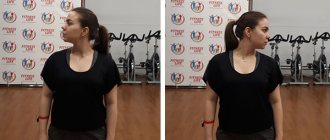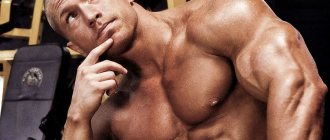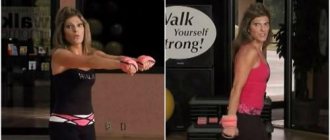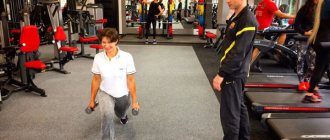Almost everyone has heard about the need to engage in fitness under the supervision of an experienced trainer.
In the first stages of visiting the gym, you simply cannot do without the help of a professional. Why?
If you do not have special education, neither video tutorials nor advice from friends will help you build the right training process.
No one will monitor the correct execution of the exercises, the proper distribution of loads and the uniform pumping of all muscle groups.
What can we say about proper nutrition, which no one will tell you about either!
A qualified fitness trainer is your guide to the world of sports, health, and an ideal figure.
But how to choose your ideal trainer who can lead you to the desired result?
There are a number of criteria that must be taken into account when choosing.
Where to look for a trainer
When choosing a professional instructor, start by choosing a fitness club.
Priority, the “rocking chair” closest to the house does not work here.
It may turn out to be a weak fitness club, where trainers change every month, and no one cares about their qualifications.
By choosing a “convenient” but undignified club, you risk working with a coach who will not only not help you develop, but will also undermine your health.
Millions of “broken” backs and spinal hernias are an example of this.
Therefore, do not try to save money on a fitness club.
Choose a reputable establishment, remembering to first read reviews about it on the Internet.
Moreover, buy one-time lessons at a couple of clubs you like, watch the instructors at work and ask the visitors’ opinions.
Get information about the instructor
To ensure that working under the guidance of a coach does not disappoint, when choosing a suitable gym, give the administrator a “biased interrogation”.
Ask him to recommend the best instructor, and at the same time ask about his age and education.
An important note should be made here. A person who has graduated from a sports or medical university can work as a coach.
Nowadays there are many online schools for training fitness instructors.
The quality, efficiency and results of the work of such “online trainers” can never be compared with years of training in special institutions.
The first option is preferable. True, having a higher education is not a guarantee that a person is a professional in his field.
It may turn out to be a very young guy who will gain experience from people like you. The optimal choice is an instructor with education and 4-5 years of experience in this profession.
But there are pitfalls here too.
There are professionals with experience who have long lost interest in work, and they train lazily, believing that their students should grasp everything on the fly, and they are not obliged to repeat and bring the execution of an element to perfection.
At the same time, “green” trainers captivate you with their attention and care, desire to help and sincere pride in your results.
Chat with the instructor himself.
Ask if this is his main job, or just a part-time job?
The first option is preferable, and if fitness is an additional source of income, you should seriously consider whether you need such an instructor.
It is obvious that he is not so deeply involved in the training process and does not know all the nuances.
All this will negatively affect his clients, including you.
There are also “seasonal workers” - coaches who work only for seasons, i.e. in winter and spring, when there is an influx of customers.
Such people have one goal - to earn money without making much effort.
It is simply pointless to study under the supervision of such a person.
Personal qualities
It happens that you come to an experienced and educated trainer, but the classes don’t go well. In addition to the fact that a person must be a professional, you must also like him. It will be difficult to achieve your goal if the coach could not inspire you and if you are uncomfortable communicating with him. After all, you have to tell the coach details about the state of your health and share the results. And if the person is not very pleasant to you, it will be difficult. You must also completely trust the coach, so it is very important to find contact.
Rate the fitness trainer's appearance
Appearance plays an important role in choosing the right instructor.
Of course, a professional in the world of athletics must look impressive himself - captivating with sculpted muscles and a neat appearance.
However, a trainer “as in the picture” is not the best selection criterion. A beautiful body is not at all a guarantee of deep knowledge of human anatomy and physiology.
In addition, there is no guarantee that he did it without the use of pharmacology.
Therefore, first of all, pay attention to his clients. And ideally, get to know them and clarify all your questions.
How long have they been studying with the fitness instructor you liked, what problems did they address to him and what successes did they achieve under his leadership?
Practice shows that clients will tell a lot more about a trainer than he does about himself.
Trial lesson
Even if you have weighed all the points described above and have chosen what you think is the ideal mentor, there is no need to rush to sign up for an annual subscription. First you need to conduct a small, so to speak, test drive of the instructor. At the same time, be prepared for a detailed analysis of what is happening.
The primary task of any coach is to identify the current level of preparedness of an athlete. After which the instructor must create an individual training and nutrition program, and not a general one. It should be tailored exclusively to your needs and wishes.
In this regard, the mentor should ask you related questions to get a complete picture. If this does not happen, then ask yourself: who will draw up the program, how and when. If there are no answers, then it is better to find another specialist. An intelligent instructor will always find a common language with the student; there should be no problems with understanding.
Another, no less important point is the instructor’s technical knowledge. If he calmly uses specialized terms and clearly explains their meaning to you, then you are on the right track. In addition, if the trainer answers your thematic questions quickly and clearly, then you can consider that the test has been passed.
The first lesson is indicative
Don’t rush to immediately purchase a set of classes from your chosen instructor.
Take one or two lessons and observe his behavior.
Before starting training, a competent specialist will definitely ask about your health status, existing diseases and possible limitations.
A fitness trainer must know how to properly work with people who have disabilities due to osteochondrosis, vertebral hernias, scoliosis, obesity or hypertension.
He must competently draw up a training program, taking into account existing diseases, dose the loads and monitor the correct execution of the elements.
This is where the whole value of the instructor’s work lies.
Without such help, you risk harming yourself and worsening your existing disease.
Therefore, pay attention to whether the coach will be interested in your health.
The lack of questions and a dismissive attitude towards your problems is a clear reason to find another instructor.
Do not be alarmed if the specialist, in addition to asking questions, asks you to measure your blood pressure or begins to examine your pupils.
Moreover, it is even welcome if an experienced trainer checks your flexibility and asks about the sensations in a particular position.
Why is it worth paying for his services?
To briefly summarize the above, we can highlight the main points:
Safe performance of all exercises. The trainer will ensure that all exercises are performed correctly. During the class (from the moment you enter the gym until the moment you leave), a personal fitness trainer will monitor the technique of performing the exercises. He will adjust the exercises so that there is maximum load on the muscles.
Varied program. Doing the same exercises every day won't give your muscles enough rest.
A professional fitness trainer will develop a program for his client that involves performing exercises on different muscle groups at different times. This way your workouts (circuits, splits, supersets, intervals) will be much more effective.
Meals will be selected taking into account your individual preferences and health.
Thus, the services of a fitness trainer also include the responsibilities of your personal nutritionist.
If you want to get beautiful results in the shortest possible time, you need to find a personal fitness trainer who will force your body to train and acquire the desired shape.
Evaluate his way of creating a training program
You need to start training in the gym, even under the supervision of an instructor, with light exercises.
If the trainer starts squeezing all the juice out of you at the very first lesson, drawing up a training program literally right away, it means that you have come across an unprofessional.
Any specialist needs time to assess the potential of his client.
Moreover, he, like no one else, must understand that an untrained body needs to be given time to adapt.
Only after observing the ward over several sessions, the coach will be able to draw up a competent training plan with a gradual increase in loads.
There are two things to be wary of.
If after training you literally crawl out of the gym and spend the rest of the day recovering, it means they are working with you incorrectly.
In addition, if pain occurs during exercises, and the instructor’s tips do not help to correct the situation, you should think about choosing another specialist.
By the way, you shouldn’t ask a fitness instructor to choose a suitable diet for you.
This should be done by a qualified nutritionist, preferably with experience.
As for the trainer, he has the right to give you general recommendations on nutrition, but nothing more.
Why do you need a coach?
Do you have a specific goal that prompted you to play sports? A coach will help you achieve it. There are different loads and types of exercises for different purposes.
For example, if your goal is to lose weight with a fitness trainer, a professional will help you give the correct and, most importantly, effective load individually for you. He is the one who will be able to control and will not allow your laziness to persuade you to abandon the last approaches in performing the exercises.
A competent specialist is not only an athlete who will put stress on your body, he is also a competent nutritionist who will adjust your diet and help you follow all the recommendations. It will control all your actions, minimize the possibility of injury during exercise and your nutrition.
Unfortunately, self-confident beginners try to lift as much weight as possible in their first lessons and thus end up with a variety of serious injuries - from bruises, dislocations, ruptured or sprained ligaments and muscles to spinal damage.
The simplest exercise is to try moving your arm or leg. Moving in different directions, different muscle groups are involved. Now imagine what will happen to the muscles if you take too much weight and do the exercise incorrectly.
Unfortunately, not all exercises can be successful the first time. That is why there should be a professional nearby who will advise and help correct the implementation.
If something doesn’t work out the first time, the coach will help and tell you which muscle group needs to be strengthened in order for the student to succeed. The best fitness trainers can easily cope with the task assigned to them.
Provide feedback
Feedback is extremely important when communicating with a coach.
Therefore, try to be as frank as possible with your instructor.
Tell him about what you want to achieve, pay attention to the exercises that you don’t like, and frankly admit if you violated the regime.
It is important to understand here that even a well-thought-out individual program is still just a guess.
It may need to be adjusted depending on your state of health and well-being.
And without full feedback, this is impossible.
If, after a month of training, you do not feel this feedback, if you understand that the trainer is only making demands, without listening to your state, it is better to say goodbye to him and find yourself another instructor.
How to choose a personal trainer
One of the most important tasks for a newcomer to the gym is to find YOUR trainer. One who will not only be a sculptor of your body, but also partly a doctor, psychologist, nutritionist, and even, if you want, a little supervisor. Of course, each person needs a special approach. For some, a subtle understanding with a personal trainer is important, while for others, they will not achieve results without a “tight hand.” What to whom?
That's why it's so important to take a closer look. No, no one says it's the coach's choice
- This is a choice once and for life. As they say, “not to baptize children.” But, you should be selective in this matter, if only for the reason that you trust him no less, and the most valuable thing is your own health.
How do we choose a coach? What do we pay attention to first?
That's right, in appearance
. This is probably correct. Appearance, or more precisely, physical development, is the calling card of a coach. That is, looking at a fit, athletic and energetic person, we think - since he (or she) was able to “make” such a body for himself, then he will help me too. Correct logic, no doubt. But you shouldn’t forget that you’ll have to sweat a fair bit (and the coach was sweating, no doubt about it!).
Therefore, a trainer’s “presentation” is important in his work almost as much as a well-groomed appearance for a top model. They evaluate first of all by appearance, and only then by personal qualities, merits and experience. That's how it works.
Personal qualities
is the next thing on the list (and often the last) we look at. Assessment of personal qualities, as a rule, occurs at the first contact or (preferably) when observing the trainer’s personal sessions with his other students. Never rush! Nothing bad will happen if you do the first few workouts on your own. Give yourself time to identify the “object” to observe, take a closer look at it. Unfortunately, there are people who actively work on themselves, look good and so on, but that’s where their interests end.
A good coach is, first of all, an interested person. A good coach cannot and should not be indifferent!
And this applies not only to “our own people,” but also to those who study on their own. A good coach will never pass by a person who makes a mistake or does something wrong. After all, such a coach knows that mistakes in technique can lead to injury.
So, take a closer look. Did you like everything, did you gain trust? Chat in person. After all, the manner of communication largely determines how comfortable and, most importantly, how effective your classes will be. Communication with the trainer is an integral part of training.
But! The coach should not be too talkative. What does it mean? Should he be silent? Of course not. But personally, I prefer that the coach would do more, show more, “drive” if you like, and speak to the point. Essentially, this means about technique, about training theory, about biochemical processes in the body, about proper nutrition. And NEVER - about the weather, about nature, about your family, about your family, and so on. These topics should be prohibited during training!
Although there are trainers who like to talk about abstract matters. This is how they “get closer” to their clients, becoming almost friends. A person gets used to the fact that he comes to chat, “talk” and strives to do exactly that in the end, and not carry dumbbells and strain in any other way. By nature, a person consciously and unconsciously chooses what is more pleasant and easier
. That's how it works. Yes, and leaving such a “trainer friend” is much more difficult, even if it becomes obvious that the training is not producing results, and time and money are wasted.
Excessive warmth in communication with a coach is the enemy of sports results! You pay money to work, to sweat, and not to have heart-to-heart conversations.
Yeah. Already good. Next comes the turn of the first personal training session
. This lesson should be introductory, like the first of September at school. In the first lesson, a kind of starting point is determined. Your initial physical level. preparation, endurance, etc. A good trainer will even put you on the scale and ask you about your diet. To know what to “dance” from. And of course, he will find out your cherished goal of going to the gym. For what, in fact, was everything started?
To make it more clear to you what kind of coach is standing in front of you, give him something like a test. Below is a list of some guiding questions, the answers to which will help you navigate and decide whether to connect your training with a specific person.
| Your leading question | Trainer's sample answer | What follows from this |
| I want quick results, can I work with you every day? | It is forbidden. Both the body and the psyche need rest. Daily intense physical activity can lead to the development of overtraining syndrome. This means a stop in progress, a possible decrease in body weight and strength indicators. And also a simple reluctance to continue training. Everything is good in moderation. | If your coach doesn't mind training you every day, then he just wants to earn more money. We are not talking about any benefits here, only about benefits. In general, if the answer is this, then there is no point in asking the following questions. You just have to leave. |
| My back hurts and my knees creak, what should I not do in the gym? | If the pain is constant and acute, then you shouldn’t come to the gym at all! We need to go to the doctor ! Make a diagnosis. If the diagnosis has already been made and there are no serious problems, then it is worth individually selecting certain exercises that are gentle on the back and joints. Eliminate axial load and treadmill. When it comes to cardio equipment, give preference to the ellipse. | If the trainer says something different, then perhaps there are gaps in medical knowledge or a lack of sense of responsibility. This is a bad sign; every coach should be familiar with exercise therapy. It might also be worth changing the coach. |
| Is working out on an empty stomach more effective for weight loss? | Working out in the gym on an empty stomach is strictly prohibited! An extra couple of grams of lost fat is not worth an attack of lightheadedness and hypoglycemia. | Indeed, there is an opinion that training on an empty stomach burns fat deposits more effectively. But a responsible coach is responsible because he thinks about your health too. And at the initial stage of sports, “hungry” training is simply dangerous. If a trainer advises you to practice “without a drop of poppy dew in your mouth,” then such a specialist is “worthless.” And you pay far from pennies... |
| Is it possible to eat before training? | Necessarily. But no later than an hour, an hour and a half before, so that the food has time to be absorbed. A heavy stomach is a bad aid in sports. | An elementary question. And if the coach finds it difficult to answer it, then it is not clear how he himself practices. This is basic knowledge, without which there is no way in sports. But, frankly speaking, there is hardly a coach who does not know the answer to this question. |
| Is it possible to eat anything for fast muscle growth? | Rapid muscle growth means unnatural growth. But real victory and good, long-term sports results only come from hard work. Muscles, and the body as a whole, can and should be supported. But these should only be natural supplements from well-established manufacturers. In general, it’s worth trying to exercise without sports supplements. It is quite possible that the result will be satisfactory anyway. It’s good if the trainer advises you to take flaxseed oil or fish oil. | The imposition of any drugs is unacceptable. A coach can share his personal experience, especially since there are a lot of really useful sports nutrition. But there shouldn't be any pressure. |
And the final advice, “for a snack.”
Never turn to the fitness center staff for help in choosing a trainer! Remember that this is a working team, with all the likes and dislikes characteristic of any team. In addition, a personal agreement with a percentage “from the client” is possible. But it’s worth asking the staff about the availability of special equipment. education of the coaching staff
.
Perhaps among the coaches there are certified specialists who graduated from the Institute of Physical Education, competition winners, masters of sports, or at least candidates for masters. I say “possibly” because I know that not everywhere and not always a fitness trainer is a person with a professional background. education. Unfortunately, in some sports clubs, professional education is not a criterion for selecting employees.
They hire on the principle “if you pump yourself up, you can train others.” That is, the eternal theme of “meeting people by their clothes.” I apologize in absentia to all
conscientious trainers if any words from this article hurt your feelings and the feelings of your colleagues. There are good trainers! But there are few of them, as true professionals in their field. After all, not every shell contains a pearl. But know that those who came across such a “pearl”, who were lucky with their coach, with you, “get sick” of sports for a long time and retain a huge feeling of gratitude in their souls!











